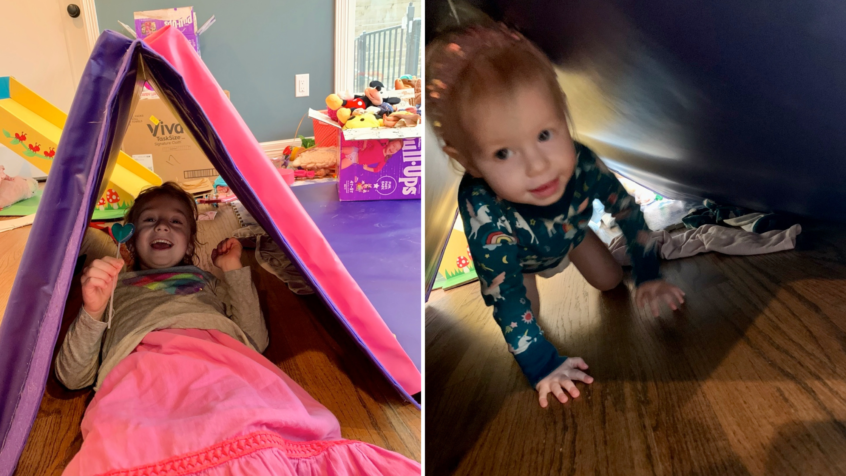My daughters and I were playing in our living room recently, which is really their playroom. All their toys, animals, and accessories live in that room.
Ellee, our 5 year old, folded her accordion-style gym mat so two of the sections made an “A-frame.” After she got the two pieces of her mat to stand in place, she crawled inside it and announced “this is my house.”
Meanwhile, Grace, our 2 year old, was jumping around on the other section of the mat. When she saw her big sister come out from inside the A-frame (to get provisions & decorations for her house, of course), Grace looked at it for a couple seconds to process. Then, her face lit up and she yelled out “a tunnel” and immediately crawled through it to the other side.
It was the same structure. Ellee saw it as a house. Grace saw it as a tunnel.
This is a fun illustration of how our perception works. We experience things in the world, even the same things as other people, yet each of us process it differently, based on our perspective, and create our own unique perception.
Numerous research studies show that humans process the external world (what we see, hear, feel, taste, smell) through a mental filtration system that is influenced by past experiences. Those experiences shape the way we respond to our current environment and the way we see things mentally and emotionally.
Ellee and Grace actually show this nicely. Ellee is learning to draw. She is taking shapes that she knows and using those to make drawings of things. A triangle, she’s learned, is the shape of a house roof. The A-frame. Makes sense she would perceive or imagine the mat to be a house.
Grace, on-the-other-hand, one of her favorite activities at school is crawling through a tunnel that is the shape of a triangle. Again, based on her experiences, a triangle shape that a kid crawls through is a tunnel. The same mat-to-A-frame construction, interpreted differently by each kid based on their perception, shaped by their experience.
What does this mean for us? It simply illustrates that the way we all see the world is individually shaped by our perceptions, which are influenced from our previous life experiences.
It also means our perceptions – or mindsets – vary from person to person. And if they can vary from person to person, there are infinite ways to perceive situations. If there’s no right answer, we can have any answer we choose.
We can see a house or a tunnel. We can believe things are good or that things are bad. We can make judgments. We can perceive that we can do something or that we can’t do something. Most importantly, we can perceive that we are in control of our lives or that someone or something else is in control.
You already know if we have limiting beliefs about ourselves or situations we find ourselves in, that belief will negatively impact us. However, if our perception can shift & change, we can shift our mindset. It’s possible that any of us can choose to see that A-frame mat as a house or a tunnel.
In the preeminent book Mindset by Carol Dweck, she illustrates this point by telling a story of a graduate student that became demoralized when her research paper was peer reviewed in advance of being published. The student saw the reviews as criticism of her entire student career and gave up pursuing it further. Dr. Dweck mentioned that it’s the reviewers’ job to critique, not praise. The grad student shifted her mindset to believe it’s their job to poke holes and her job to fix them. With that adopted mindset, the book says, it got her from stuck to unstuck and drove her to fine-tune her article to meet the demands of the peer review. Her paper was published.
So, let’s get back to the burning question at hand… is it a house or a tunnel? The answer is yes. If Ellee sees it as a house, then that’s right; if Grace sees it as a tunnel, that is also right. The real question is does your perception of the environment support the person you want to be and aide in your success? If not, you have the power to shift your perspective such that your perception naturally evolves.

